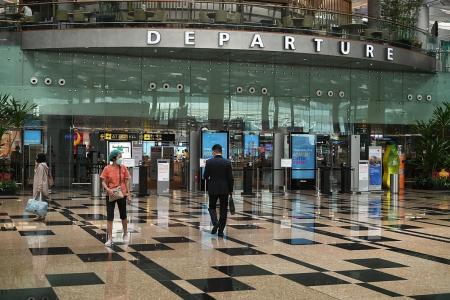Travel with fewer curbs a possibility from early September
Singapore aims to have about 80 per cent of its population fully vaccinated by then
Overseas travel with fewer restrictions could become a reality after early September, when Singapore aims to get about 80 per cent of its population fully vaccinated against Covid-19.
By that time, larger groups may also be allowed to congregate, especially if they are fully vaccinated, Finance Minister Lawrence Wong told Parliament yesterday.
In a statement outlining the country's plans for tackling the virus in the near future, he said Singapore will begin reopening its borders for vaccinated people to travel.
"We will start by establishing travel corridors with countries or regions that have managed Covid-19 well, and where the infection is similarly under control."
With these arrangements in place, fully vaccinated individuals can travel without serving the full 14-day stay-home notice (SHN) in a hotel.
Instead, they will simply be subject to a rigorous testing regimen or serve a shortened seven-day SHN at home, depending on the risk level of the country they visit, Mr Wong said.
A person is considered fully vaccinated two weeks after receiving the second vaccine dose.
People who are not vaccinated will still be able to travel but must abide by the prevailing restrictions.
Looking further ahead, Singapore will carry out a series of "progressive easings", keeping a close eye on hospitalisation rates and intensive care unit admissions as it does so.
Coronavirus cases are likely to rise when the rules are eased, Mr Wong said, due in part to ongoing "cryptic" transmissions in the community, which can cause new clusters with increased activity levels.
SLIP THROUGH
Singapore is also likely to see more imported cases once people are able to travel more freely, with infected individuals "slipping through from time to time".
In his statement, Mr Wong explained why the task force "made the difficult decision" to return to phase two (heightened alert) - a move that has drawn criticism from some quarters.
He said the large clusters that formed in recent weeks showed how easy it is for the Delta variant of the coronavirus to spread and potentially overwhelm Singapore's hospital system.
Vaccinated individuals may experience very mild symptoms when infected, inadvertently becoming asymptomatic carriers.
"By the time the cases pop up, days or even weeks would have passed and the infection would have spread to many people," he said.
Facing the risk of widespread community transmission before enough people have attained adequate vaccine protection, Singapore thus decided to tighten the rules.
Stressing that vaccination remains the key to further reopening, Mr Wong said: "I make a special plea to all who remain unvaccinated or have not registered to be vaccinated, especially our parents and grandparents: Please come forward."
Get The New Paper on your phone with the free TNP app. Download from the Apple App Store or Google Play Store now


